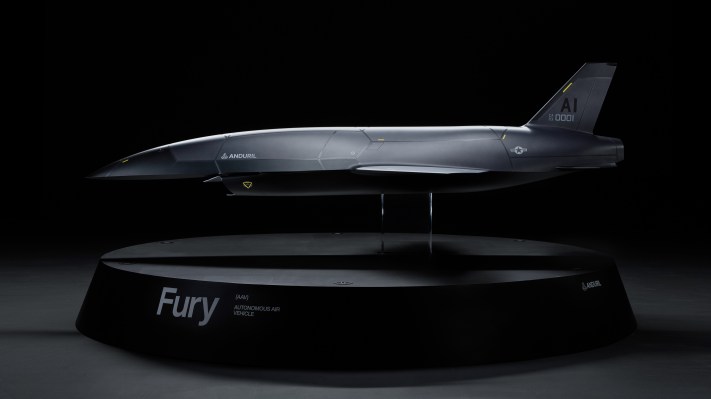Venture-backed defense giant Anduril Industries is acquiring Blue Force Technologies, the advanced design and engineering firm behind the “Fury” unmanned fighter jet, as the company looks to build out its suite of autonomous systems for national security customers.
The new acquisition positions Anduril to take advantage of what chief strategy officer Christian Brose called “the most important space with regard to autonomous aircraft.”
Autonomous fighter jets have “the attributes that you’re going to need to be relevant to what everybody is focused on right now: the pacing threat of China, competition in the Indo-Pacific theater,” he said. In those theaters, capabilities like long-range, speed and greater payload capacity — capabilities of a fighter jet — are key.
Manned fighter jets, like Lockheed Martin’s F-35, are enormously expensive, exquisite systems: Last year, Lockheed inked a deal for 398 aircraft at a cost of $30 billion. Anduril is envisioning something different for Fury — and for the rest of the unmanned systems in its product line. That vision includes lower-cost systems, built at a high volume, with zero human operator on board.
“[Fury] doesn’t cost what an F-35 costs,” Brose said. “Not even close.”
Once it eventually starts flying, Fury will run on Anduril’s Lattice AI-powered software, as do all of the company’s other systems (and many third-party platforms). As the name suggests, Lattice acts as an overarching orchestrator for unmanned system operations; the company said earlier this year that its Lattice for Mission Autonomy platform will enable a single human operator to coordinate autonomous assets at the same time.
The new acquisition also provides Anduril key expansion into North Carolina’s Research Triangle area, where Blue Force is based, and access to their around 90-person team. While the Fury jet is one of Blue Force’s centerpiece technologies, Anduril will no doubt also benefit from the company’s composite manufacturing, tooling and production capabilities.
“We as Anduril intend to really pour significant capital and investment into the company,” Brose said. “Our thesis on acquisitions is, we don’t buy fixer uppers […] We are looking to acquire teams and technologies that have the ability to do additional great things for the company and the country moving forward.”
The terms of the deal were not disclosed. The new acquisition comes a little over two months after Anduril announced it was buying solid rocket motor company Adranos. Acquisitions are clearly a key part of the company’s growth strategy: Other buys include Dive Technologies, an autonomous underwater vehicle developer; passive sensing company Copious Imaging; and unmanned surveillance drone startup Area-I.
